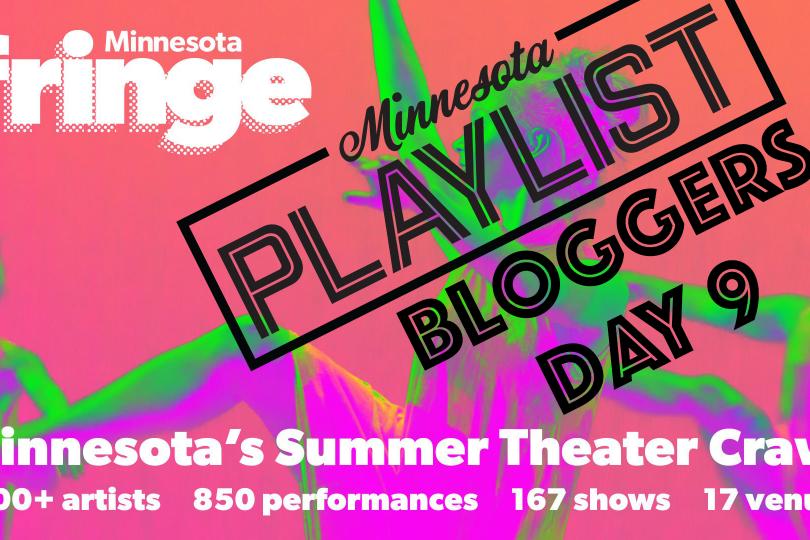Fear and Fringing in Minneapolis: Wrestling with your demons through theater

Fear is something I’m constantly struggling with. It’s been a huge influence in the past year (politically and otherwise), it’s a nasty part of anxiety and depression, a systematic issues caused by oppression – the list goes on. It’s something I’m personally working to resist and unlearn in my own life and what better place to tackle than in Fringe. There’s plenty of things to cause worry and fear – writing and producing your own show, worrying about getting places on time, fighting crowds, having shows sell out before you can get a ticket, social anxieties caused by talking strangers – again, the list continues. So this year, I arranged the shows I was going to see for this post based on fears. What scares me? What gets under my skin? What can I see that will speak to things I’m trying to stop being afraid of? Limiting myself to the West Bank (cutting out the fear of being on time, which was just too much), this is what I found.
Frankenstein
This reinterpretation of Mary Shelley’s classic faced me with this fear – what happens when you come into a show with the wrong expectations. I thought I’d be seeing a show based of the novel that dealt with death, creation, power, and why playing God leads to trouble. Instead, I saw an adaptation that took the characters from the novel in put them in an entirely different situation – where Victor is the monster and the creature is a hapless creation being holed up in his lab. Instead of encountering the fears I expected – death and the macabre – I encountered a different sort that I’m deeply afraid of as an artist: what happens when you enter a space with expectations that are not met. I can’t hold a show accountable for expecting a different show than what I received. It’s difficult when you’re working with adaptations but you can override these assumptions with the right context. I either didn’t get the context or missed something. Or maybe it wasn’t clear. I spent most of the show trying to figure out who one character was that only Victor Frankenstein seemed able to see. Online she’s described as the narrator. Maybe I needed to investigate the Fringe website more before entering the space or maybe a program giving this information would have helped. Nevertheless, I spent most of the show fighting my own knowledge of the novel and trying to let the story unfold as it did, which did include a different look at this story and an intrepid cast of Lisa Day, Maurice Fields III, Cate Jackson, Jacob Krohn, Julie Manning, and Laura Mason.
Anarchy: a handbook
Fear can come from not understanding and anarchy is a political philosophy I know little about. In fact, the basics of what I do know about anarchy can be rounded up in three points:
- Emma Goldman was a badass.
- Leon Czolgosz, who was obsessed with badass Emma Goldman, killed President McKinley, and terrifies me with his empathetic rationale, best seen in the eerie portrayal he gets in Stephen Sondheim’s Assassins.
- According to this guy at the U of M who refused to sign in support of voting no against the gay marriage ban back when I was in college, anarchist don’t vote.
Anarchy: a handbook, however compels you to rethink what you know and inform you on what you don’t about anarchy. What I do know has been tainted by my bad personal experience, my limited historical knowledge, and influences of a culture that’s convinced us anarchy is wrong and destructive. This show gives us a complicated understanding of the issues for and against anarchy. As quoted on the back of the program, Bertolt Brecht “argues that in order to understand the complexities of the world, one must learn to see complexly.” This show works to do just that. It presents sketches of sorts, some humorous and gut-bustlingly hilarious, others painfully sad and heartbreaking, including one sketch that feels improvised off of the actors’ personal experiences (I don’t know that it is; but it has that a deep, intimate vibe that makes you think it could be). This incredible ensemble of Roger Bechtel, Nathan Bern, Shannon Foy, Emma Halper, and Bethany McHugh also feels close and connected with each other, likely due to the fact that Bechtel teaches at Carleton College and all but one of the actors have studied with him there. Grappling with issues of how to speak truth in a post-truth time, saying “I would prefer not to,” and fighting back against power structures inherent in the world, the pros and cons of anarchy are negotiated. Are peaceful protests the only answer? Can we really “stick it to the man” by not paying our bills? How do we fight apathy and stay connected and motivated?
This show sums up the current political climate perfectly and speaks not just to the fears we have about the world, but the fears we have of not doing enough and what to do next. I’m not really scared of anarchy - I’m scared of not knowing that the right action is in our world. But I do know that anger is a great motivator, and anger is a large part of anarchy. As Mr. Nancy says in the television version of American Gods, “Angry gets shit done.” While angry can’t work alone, knowledge and the need to learn more can help spur change. This show gives me that drive and I feel it empowers its audience to action. That’s one hefty blow to fear.
Songs for a Post-Apocalyptic World
If you’ve been reading the news, it looks like we might be living an apocalypse, or on the brink of one. So the relevancy of this show was not lost on me. But hey, if I die in a nuclear holocaust this weekend, at least it’ll be in Fringe doing what I love.
Songs for a Post-Apocalyptic World takes place after this doom has occurred. Civilians are gone and all people are soldiers, endlessly fighting. Resources are scarce but one soldier, Jamison, has discovered an old book from a world in which peaceful protests existed as a way to fight back. They try this method of non-combativeness against a rival group and are captured. Just when the other group is on the brink of understanding this idea, one of the captured soldiers lashes out and violence ensues again. Moving away from this story, we’re introduced to the concept that after the population of the world was destroyed by something from outer space (I got lost in this – there was mention of a black hole, then later it was a meteor. This might have been Fringe fatigue messing with me), humans genetically mutated in order to reproduce and spawned magnetic genitals. Yes, you read that right.
This show had wonderful music – a lot peppier than I expected, given the apocalypse and all. I did get lost in trying to figure out what happened between the catastrophic event (and magnetic genitals) and the soldiers fighting eternally. While I love sci-fi, I can easily get overwhelmed by jargon that isn’t explained and I was missing out on some connections to the characters. It felt sort of fairytale-like, and I could have easily let light character development go with that. But because there was music, I think it made me want to know more about the people who were pouring out their ideas about the world into melodies. I was fighting expectations again as I was expecting a much darker show, but I enjoyed that it was lighter and felt (at times) a little more optimistic. The cast of Lauren Drasler, Megan McDonald, Joe Picardi, Grant Ruckheim, Cory Tiesel, Katie Widen, and Mari Widen were wonderful as were musicians Andrew Bartelson, Chris Fahey, Abe Heyn, and Rick Widen. While I felt a little lost at times, I still enjoyed myself and learned I’m not really afraid of the apocalypse. But I am terrified of magnetic genitals.
Jefferson Township Sparkling Junior Talent Pageant
Okay, so why does this show fall into the category of fears? Because child beauty pageants are scary. Honestly, Honey Boo Boo is the stuff of nightmares. Unrestrained child drama, superficiality at its extremes, and making young girls look like grown women? All problematic, to say the least. This new musical deals with all of that in a small town that cancelled its pageant after a young contestant was killed mid-tap dance. Frannie, an original contestant, has returned back to Jefferson, hoping to piece back a life that has fallen away from her expectations. After running into Liam, another former contestant in the pageant, she decides they should compete to find out who would have won if the contest hadn’t been canceled. But Val, who’s been the reigning pageant winner since its unlikely demise, wants to hold on to her crown. Meanwhile, Frannie falls for former classmate Travis and grapples with what she wants in her life.
This show focuses on a lot of fears – fear of failure, of being forgotten, of making too many mistakes and being a messed-up adult, of being unloved and unaccepted. All of this is expressed through a madcap dark musical comedy that’s reminiscent of Drop Dead Gorgeous or Strangers with Candy. This show has incredible music performed by Keith Hovis and Peter Hanson and a stellar cast of Zach Garcia, Kelly Houlehan, Ryan London Levin, and Leslie Vincent. While being a winner and finding glory may not exactly be the outcome for the sparkling junior pageant contestants, finding inner truth and a different idea of success is more important as well as finding home in unexpected places.
Takeaway
While I’ve still plenty of fears to work out, these shows have given me a lot to think about, whether it’s expectations in theater, my expectations of myself, or of the world around me. There may be no easy answer to our problems, but at least in Fringe I can challenge my own perceptions and understandings one show at a time.




